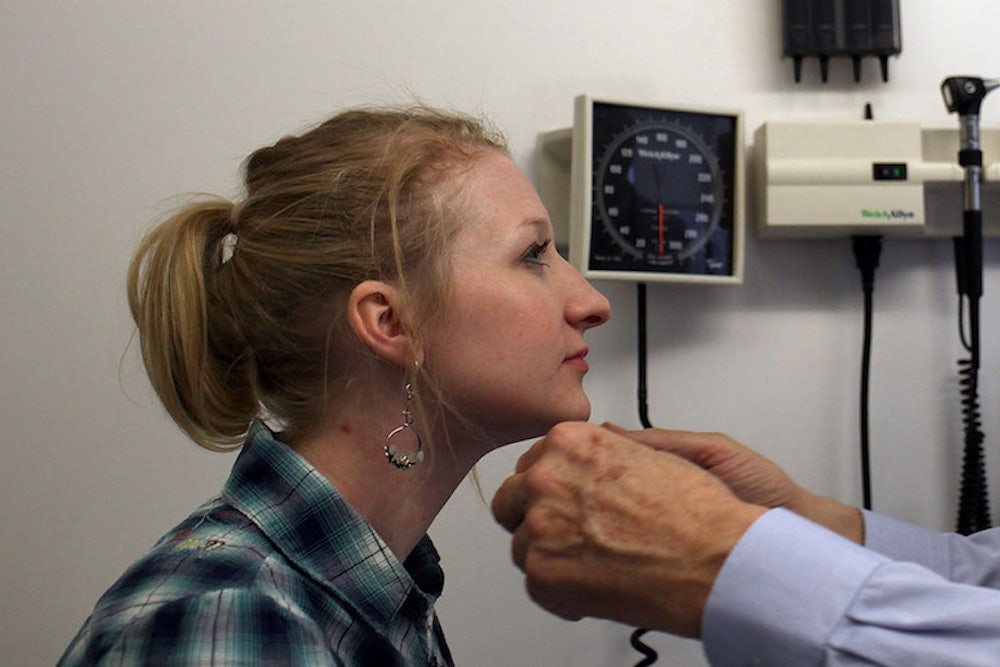The Department of Health and Human Services (HHS) last week issued its latest update on Obamacare enrollment, revealing that 3.3 million people had used the new on line marketplaces to select new insurance plans. But the data, as always, didn't include some key information. HHS didn't say, for example, how many of these people had coverage before—or, among the previously insured, what kind of coverage they had. HHS isn't trying to hide information. In most of these instances, it simply doesn't have the information, at least in a way it can reliably analyze. But it makes interpreting those official enrollment numbers difficult.
Now, thanks to Robert Pear of the New York Times, we know a little more about one key question—how many of the people selecting policies have paid their premiums. It’s an important issue: People who don’t pay their premiums won’t have coverage for their medical bills. They’re not really insured. And if Pear’s reporting is right, then about 20 percent of people fall into that category. That figure is not a hard statistic. It's an impression, taken from interviews with officials at insurance companies, and the numbers seem to vary a lot from carrier to carrier. But the 20 percent guess seems roughly consistent with other reports, including some from Wonkblog’s Sarah Kliff during an investor conference last month.
Obamacare critics will say this shows the figures the Administration has been touting are overly optimistic, which means that progress on enrollment is lagging farther behind the department's initial, internal projections. Obamacare defenders will say the number is actually pretty good, particularly if you assume that at least some of those 20 percent will pay up soon—and that hitting a mythical numerical target was never that important anyway. What matters is creating a system that functions and enrolling more people over time.
In a sense, both sides are right. The figure could be better, for sure, but it could also be a lot worse. And that’s actually a pretty good way to think about Obamacare’s performance more generally.
If you’re looking for stories to make you skeptical of Obamacare, you’ll have no problem finding them. Some of the newly insured are struggling to find doctors, because the physician networks on their new plans are so narrow. A handful of states—ironically, the ones most dedicated to making Obamacare work—still can’t get their websites working. But the bad news stories are rarely as bad as they seem. Finding doctors on the new plans is hard, but finding doctors on cheap insurance plans has always been hard—and lots of people, including the ones hunting for physicians, are awfully grateful for their low premiums. The states with troubled websites, meanwhile, are finding other ways to enroll people. And eventually, one way or another, they’ll make online shopping possible.
The same, of course, applies to the stories of apparent Obamacare success. These days you read a lot more about people getting good deals on their coverage—precisely because, as enrollment swells, more and more people are discovering first-hand what’s available. But you can safely assume that some of the newly insured will be disappointed to learn that high deductibles leave them owing substantial out-of-pocket expenses—or that, even with all of Obamacare’s new consumer protections, they and their physicians must deal with clumsy insurance company approval processes. And that's not to mention the people who are paying more for insurance than they did before, because they no longer benefit from medical underwriting and must buy policies that comply with the new requirements. Whatever greater purpose that shift may serve, many of these people aren't happy about it.
That kind of nuance doesn't always make for grabby headlines. But it's real—and you can read about it, as long as you look in the right places. Earlier this week, Avik Roy, the Manhattan Institute scholar and conservative columnist at Forbes magazine, wrote a piece called “Sorry Conservatives, Based on the Latest Sign-Up Figures, There Won’t Be an Obamacare Death Spiral.” Near the conclusion, Roy wrote, “Obamacare isn’t good for the country. But it’s not going to collapse.” He followed with a call (not his first he's made) for conservatives to think more seriously about alternatives. The piece subsequently inspired a tweet from James Poulos, another conservative writer, who wondered if maybe Obamacare might “fail to succeed but fail to fail.”
As you might guess, I’m more optimistic about how Obamacare will work out in the next few months. I also remain confident that Obamacare is good for the country—very good, in fact. But these sorts of non-hysterical debates are the ones we should be having. Most sensible observers, left and right, would agree that the Affordable Care Act has done some mostly good things, some mostly bad things, and some things that fall somewhere in the middle. The debate is over how big these effects are, how important they are, and what alternatives—if any—could have produced better outcomes.
